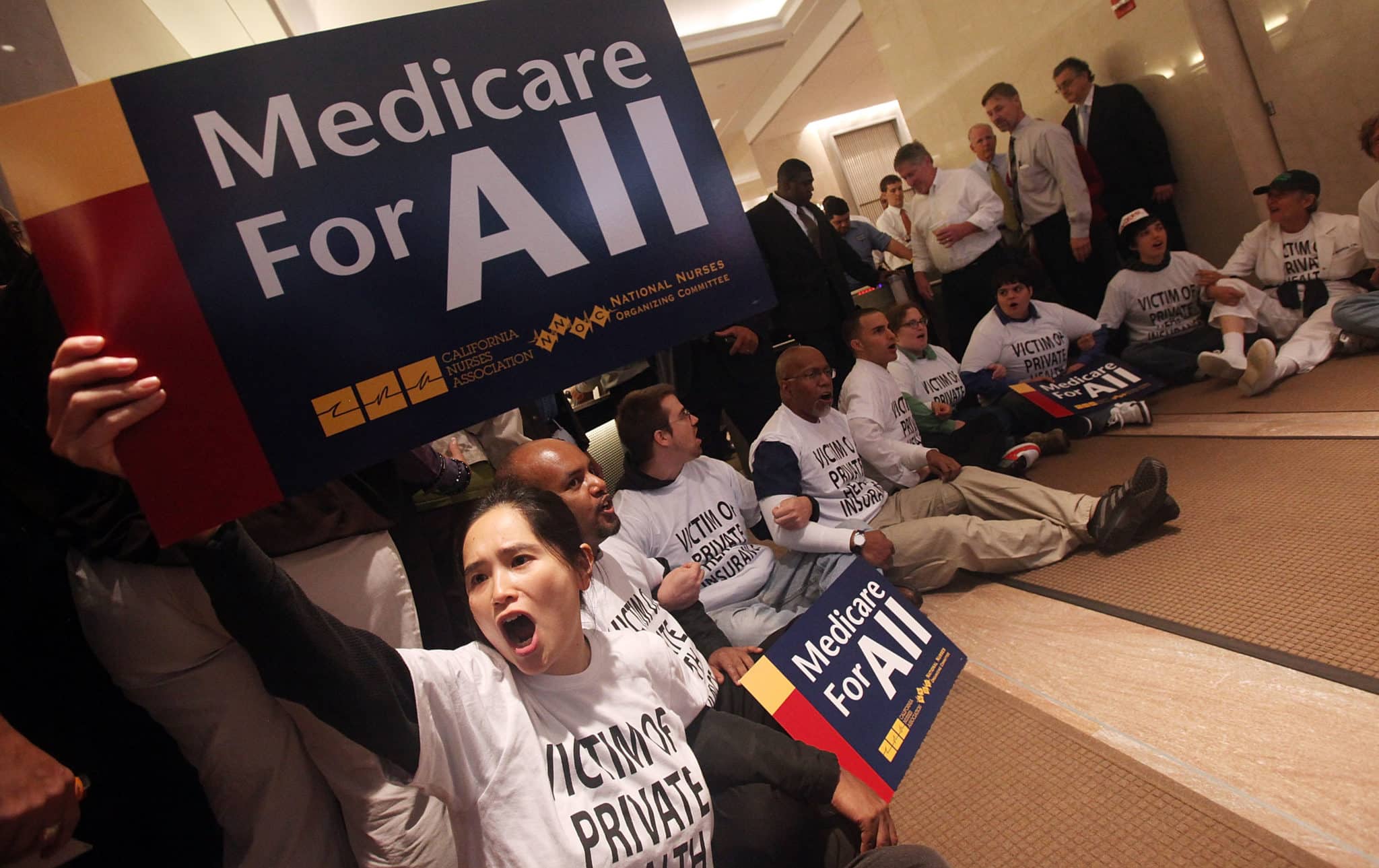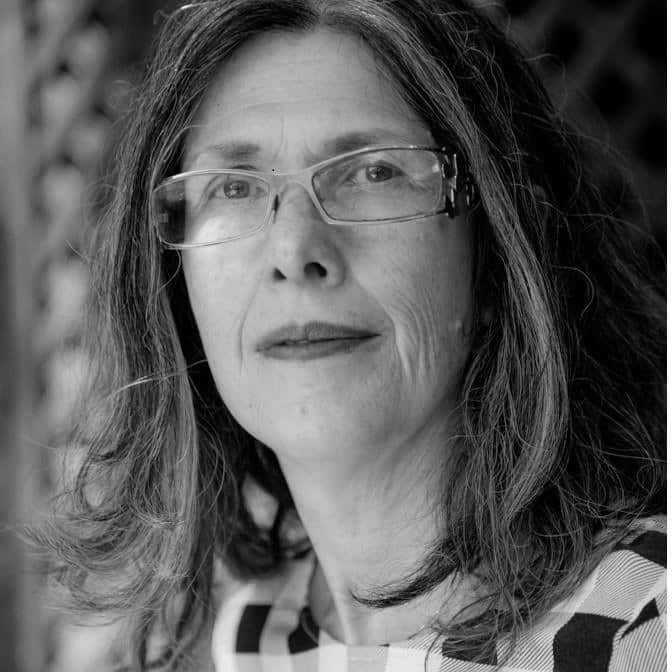 NEW YORK – SEPTEMBER 29: Health care reform supporters participate in a sit-in inside the lobby of a building where Aetna insurance offices are located September 29, 2009 in New York City. The protesters were eventually arrested by NYPD. (Photo by Mario Tama/Getty Images)
NEW YORK – SEPTEMBER 29: Health care reform supporters participate in a sit-in inside the lobby of a building where Aetna insurance offices are located September 29, 2009 in New York City. The protesters were eventually arrested by NYPD. (Photo by Mario Tama/Getty Images) From where is it derived that one who sees another drowning in a river, or being dragged away by a wild animal, or attacked by bandits, is obligated to save them? The Torah states: “You shall not stand over the blood of another.” Talmud Bavli Sandhedrin 73a
After several visits to the ER, an uninsured woman is diagnosed with COVID -19. The cost to her for treatment: $34,927.43. In the absence of a national health care system, local and state governments find themselves in competition with one another to secure vital supplies such as ventilators and personal protective equipment. The research to understand and defeat COVID-19 is hampered by the lack of a national strategy to coordinate private and public efforts.
The plague of systemic racism also sickens our country. In the wake of multiple killings of people of color by police or vigilantes, Jewish voices have risen to join those who declare that Black Lives Matter. We who believe that the human was created b’tselem Elohim, in the Divine image, have been called to witness. Jews of Color, such as those of Be’Chol Lashon, TribeHerald, and multiracial Jewish groups such as Bend the Arc, have taken leadership.
The CDC has reported that the percentage of Black Americans with COVID-19 is almost twice their percentage of the population. Black people who are infected are dying at much higher rates — sometimes four times as high — as whites. Centuries of inequality in housing, employment and health care access have rendered the bodies of people of color and poor people more likely to be weakened by environmental pollution or lack of access to health care and, therefore, to be affected by COVID-19.
The COVID-19 pandemic has heightened every racial and economic inequality that ruptures our country, along with the chaotic and fractured nature of our health care delivery, and brought urgency and clarity to our election-year conversation about “Medicare for All.” Would a national health plan create changes we need? And how could our Jewish tradition help us think about it?
What is ‘Medicare for All’?
Medicare for all, or single-payer health care, would be a substantial improvement on the Medicare system we now have. The Medicare program currently available to senior citizens would be expanded to cover every resident of the United States. Each person would receive comprehensive coverage for medical, dental and mental health expenses. No one would lose coverage because of job loss—which we now are experiencing on a massive scale — or because of a preexisting condition.
This would mean that, while health care providers would continue as they are now, either nonprofit or profit-making, they would be reimbursed through a national system. This would promote healthy competition, because patients would be able to choose the provider that best suits them. Every doctor, clinic and private practitioner would be “on the list.”
Medicare for All would be paid for by premiums assessed on a sliding scale. The very wealthy would pay more, the very poor would be covered for free, as they are now under Medicaid (MediCal) or other existing programs that would be folded into the system. All out-of-pocket co-pays would be eliminated, as would deductibles, co-insurance and other costs. This means that most working class and middle-class people would pay much less annually for medical coverage and care than they are paying now. (This is why the question of taxes is a red herring. Medical expenses for most people would plummet, and no one of any class would ever face bankruptcy because of a medical emergency.)
The national plan would act as a buying group to purchase durable medical equipment, such as hearing aids — and masks and ventilators. There would be no shortage of such equipment because its development and stockpiling would be planned on the national and regional levels. This means that in an emergency such as the COVID-19 pandemic, resources could be mobilized and distributed quickly.
The very wealthy would pay more, the very poor would be covered for free, as they are now under Medicaid (MediCal).
We need our Jewish tradition to understand this issue
We read in our Tanakh, “You will not stand over the blood of your fellow.” (Leviticus 19:16). Our Talmud, the lens through which we read Biblical texts, interprets the text this way, “From where is it derived that one who sees another drowning in a river, or being dragged away by a wild animal, or being attacked by bandits, is obligated to save them? The Torah states: “You shall not stand over the blood of another.” (Sandhedrin 73a)
From this teaching, the Rambam (Maimonides) derives an even stricter law: “Anyone who can save and does not save transgresses ‘do not stand over the blood of your fellow.’ Thus, one who sees another drowning in the sea, or attacked by bandits or attacked by a wild animal and is able to save that person or able to hire others to rescue but does not rescue.” (Mishnah Torah Hilchot Rotzeach v’Shmirat Nefesh Ch.1, hil. 14, emphasis added)
“Could hire others to rescue,” goes beyond the obligation to act during an emergency; it obliges us to intervene in another person’s slow, predictable death. This obliges us to prevent kilings of Black people at the hands of police, but also to craft new health care policy.
The Jewish world has, for centuries, extended the lifesaving obligation beyond the individual. Rabbis Elliot Dorff and Aaron L. Mackler, in their 1998 teshuvah, “Responsibilities for the Provision of Healthcare,” remind us that, among the 10 necessities a city must make available for it to be a fit residence for Torah scholars is the presence of a working doctor, and they teach that “the community shares this responsibility together with the physician.”
Josef Caro, the great early modern halachist, ruled that, “The Torah gave the physician permission to heal, this is a religious obligation and is included in the category of saving life, and if the physician withholds services, it is considered as shedding blood.”(Shulchan Arech Yoreh De’ah 336:1)
But can a physician accept payment for fulfilling a mitzvah? Yoreh De’ah next explains (336:2) that a doctor (like a rabbi) is compensated for the time and effort he or she has put into learning their craft and for the time in which their holy work keeps them from more remunerative activities. If the doctor is not allowed to withhold, and the community is not allowed to compel him or her to work for free, then the community must pay the doctor. And communities are permitted to establish reasonable fees.
As we learn in Bava Batra 8b, “townspeople may make rules for measures and prices and wages and may fine those who violate the norms.” This can apply to a single-payer health care system in which reimbursement for caregivers and hospitals is determined equitably by public servants, not by whatever providers can extract from the market or what pittance would be profitable for private insurers.
A national health plan is not a favoring of the “weak over the strong.” As Jews, we understand that, as breakable, mortal creatures, we are all “the weak.” None of us is “self-made.” We were created by One who made us responsible for one another and all creation. For us, there is no shame in compassion and no honor in being ruthless.
These principles should inform all our decisions, not only as private individuals but as citizens and actors in the public square. Our current lack of a national health plan puts persons of color and low-income people at particular risk. Just as we are obligated to raise our voices when Black lives are lost to chokeholds, this pandemic, in which lives are needlessly being lost because of an inadequate health care safety net, comes to teach us that Medicare for All is an urgent necessity. Those of us who are not allowed to stand idly over our neighbor’s blood must intervene.
Rabbi Robin Podolsky serves on the Board of Governors for the Sandra Caplan Community Bet Din and advises the Jewish Student Union at Occidental College.























 More news and opinions than at a Shabbat dinner, right in your inbox.
More news and opinions than at a Shabbat dinner, right in your inbox.